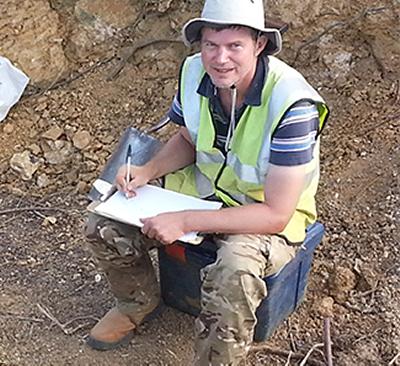explore Neanderthal site

University of Southampton archaeologists are working to save important Palaeolithic remains at a rare Neanderthal site, before they are lost to the forces of nature.
The Baker’s Hole site, at Ebbsfleet in Kent, is Britain’s foremost location for evidence dating back to the time when Britain was being colonised by early Neanderthals, some 250,000 years ago.
But researchers are now facing a race against time to excavate and examine the surviving remains, as erosion, animal burrows and plant roots threaten to damage the site.
The dig is being supported by English Heritage, Natural England and Lafarge Tarmac, who own the land where Baker’s Hole is located - an old chalk quarry next to Ebbsfleet International railway station.
In the latest phase of work, the University of Southampton’s Dr Francis Wenban-Smith has been working to identify where important deposits still survive and to find out what these can still tell us about the period.
Sediment samples were taken to be searched for paleo-environmental remains, such as snail shells and the bones of small mammals, like voles.
“These biological remains can tell us a lot of about the environment early Neanderthals lived in,” says Dr Wenban-Smith. “We can tell if the climate was warm or cold, whether the area was wooded or marshland, and other factors that help us to see the context in which they lived. They can also help date the site accurately.”
“We have one to two years to examine this area and implement a new management plan to ensure its survival, otherwise the remains will be eroded away or otherwise damaged by plants and animals, so it is crucial work like this takes place now.”
Stone tools, mammoth teeth and other fossils such as giant deer, bear and lion, have previously been found at Baker’s Hole.
Sites from this period are rarer than older ones, which date back 400,000 years and are relatively common in the Swanscombe area.
Baker’s Hole is also unusual in being one of the very few non-cave Palaeolithic sites on the national list of protected ancient monuments. It is also a Site of Special Scientific Interest on geological grounds. These protections have ensured its preservation in conjunction with the adjacent development of Ebbsfleet International and the High Speed 1 rail link.
Clare Charlesworth, English Heritage Principal Adviser for Heritage at Risk in the South East, said: “Baker’s Hole archaeological site was added to English Heritage’s Heritage at Risk Register last year because thick scrub and animal burrowing are endangering this significant archaeological site. Faunal remains are also decaying due to exposure to the elements. This clearance work is a step towards safeguarding this rare landscape for future generations.”
Eleanor Brown, Senior Geologist at Natural England added: “Natural England is delighted to support this important survey on one of Kent’s most important geological sites, which is notified for its rare combination of fossils and sediments with evidence of ancient human activity. The University of Southampton’s survey will provide a vital record of this irreplaceable site and support its conservation in the long-term.”